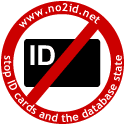You are better off writing a good password down rather than memorising a poor one.
I have already posted the method I use for managing passwords but this relatively high-tech solution is not for everybody. I am not advocating the “post-it on the monitor” that the cartoon in the last post was talking about, but for those important passwords that you don’t use often and can’t remember, write them on a slip of paper and put them somewhere safe. This is a much better plan than using a silly password that anyone can guess.
The point is that everything deserves just the right amount of security. Providing any more is counter productive. You have to balance the potential loss against the risk and take into account the inconvenience; if it is too difficult then you won’t stick with it.
Some accounts don’t need much security at all—a simple password will do for subscription news accounts and you can safely let the browser remember them and automatically log you in (but write them down anyway in case you have to change machines). Most shopping accounts are similar, but email and forum accounts need a little more care because your reputation could be at stake. For financial & eBay passwords make sure that they are good and random and keep them very safe somewhere. If you need an email account on the road then the safe place could be as simple as your wallet. This is not a good place for your online banking account however, as there is a lot of other information in your wallet to help the thief. For most systems an adequate place is a notebook in another part of the house from your PC; you are hardly ever going to use them. And, as I said before, make sure that your heirs know where they are.






 Webmaster
Webmaster
I am reminded that the password for your email account is very important if it is the account known by your bank and other *important* places. This is because if it is compromised (for any reason) then it would be easy for the intruder to request a new password from the bank and intercept the reply.